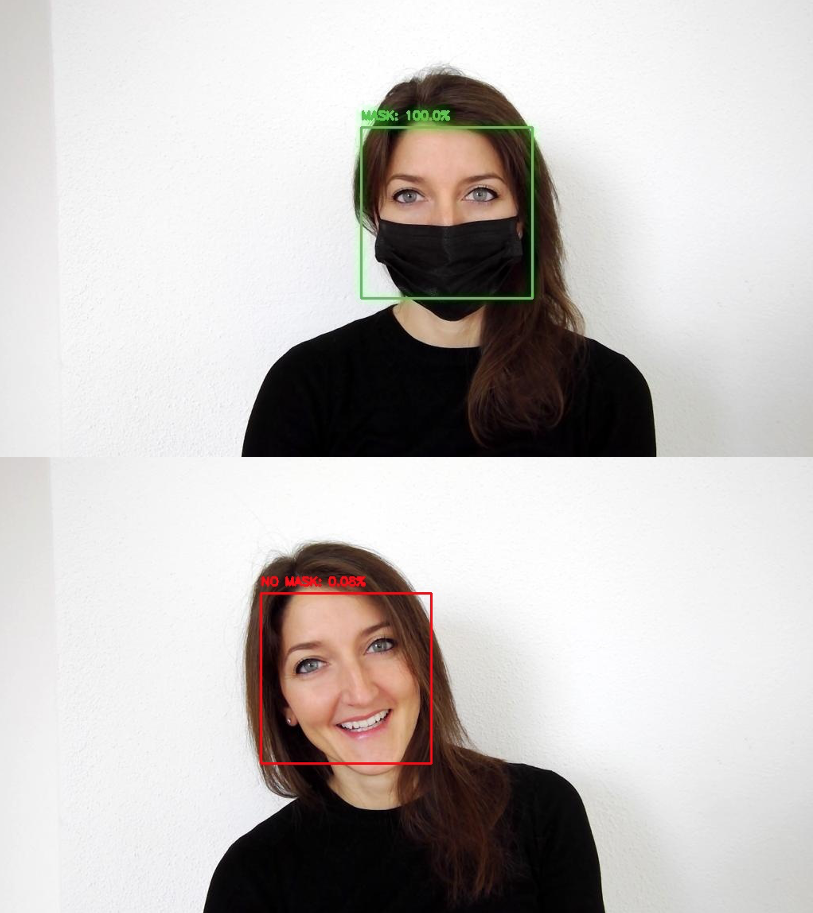
Computer Vision
DIT students develop computers with vision
20.1.2021 | THD-Pressestelle
Stefanie Beck is Managing Director at the management consultancy Fuhrmann Leadership in Karlsruhe. She is doing her Bachelor’s degree in Artificial Intelligence (AI) at the Deggendorf Institute of Technology (DIT) while working. Together with fellow students Johannes Artmeier, Lucas Fobian and Andreas Neuhierl, Beck has now developed an AI that recognises in a video stream in real time whether a person is wearing a mask or not. The research field in which Beck is working is highly regarded. It is called “computer vision”.
DIT students summarise their project as follows: “Face masks are not only necessary in pandemic situations, but above all in everyday professional life. In industry or medicine, for example. Our application ensures that the prescribed mask is worn when entering a protected space.” Such project work offers students at DIT the opportunity to apply their knowledge to practical examples. Graduates in the field of AI are highly sought after by companies. This is particularly true for the field of “image understanding”, as “computer vision” is also known. It enables computers to automatically recognise correlations in images and videos and draw appropriate conclusions. Other examples of such applications are optical inspections in manufacturing processes, object recognition in autonomous vehicles or smartphone apps that recognise faces in photos.
Since October 2020, DIT has been offering the new course “Computer Vision”, thus preparing its students for a corresponding professional career. “In the first third, our course offers an intensive introduction to the most important and, above all, practically relevant basics of the subject area,” says lecturer Prof Dr Patrick Glauner. The AI expert also explains how DIT sets itself apart from other regional and national course offerings: “I looked at what course content top international universities like the Massachusetts Institute of Technology (MIT), Stanford or Imperial College London teach.” Glauner has integrated similar content into the DIT course. At the same level and presented in an understandable way. “Even at the top institutes, in the end they only boil with water,” says the DIT professor, who is himself an alumnus of Imperial College London.
Pure theoreticians, however, are hardly in demand on the job market. What is needed is expertise in the practical implementation of image understanding applications. That’s why the students spend the rest of the semester working in groups on projects of their own choosing and applying the knowledge they have acquired in a concrete way. “Very extensive and high-quality results have emerged, which clearly show how excellently our students are positioned in international comparison,” Prof Glauner proudly reports.
In addition to Beck’s results, Glauner points to another example. Course participants Patrick Gawron and Achot Terterian developed a coin counter together. Based on a mobile phone photo, it calculates the amount of money in the purse or piggy bank that has just been emptied. “In the process, we learned how to segment coins and other objects from photos and recognise them using a neural network,” Gawron and Terterian report.
DIT has been offering Germany’s first Bachelor’s degree programme in “Artificial Intelligence” for two years. The first cohort will graduate in summer 2021. Interested students can also attend selected AI lectures and get a taste of university life at DIT again from March 2021 as part of the early study programme. If you have any questions about image understanding, AI and the degree programme, Prof Glauner can also be contacted directly at patrick.glauner@th-deg.de or +49 991 3615-453 at any time.
Bild (DIT): Digital face recognition